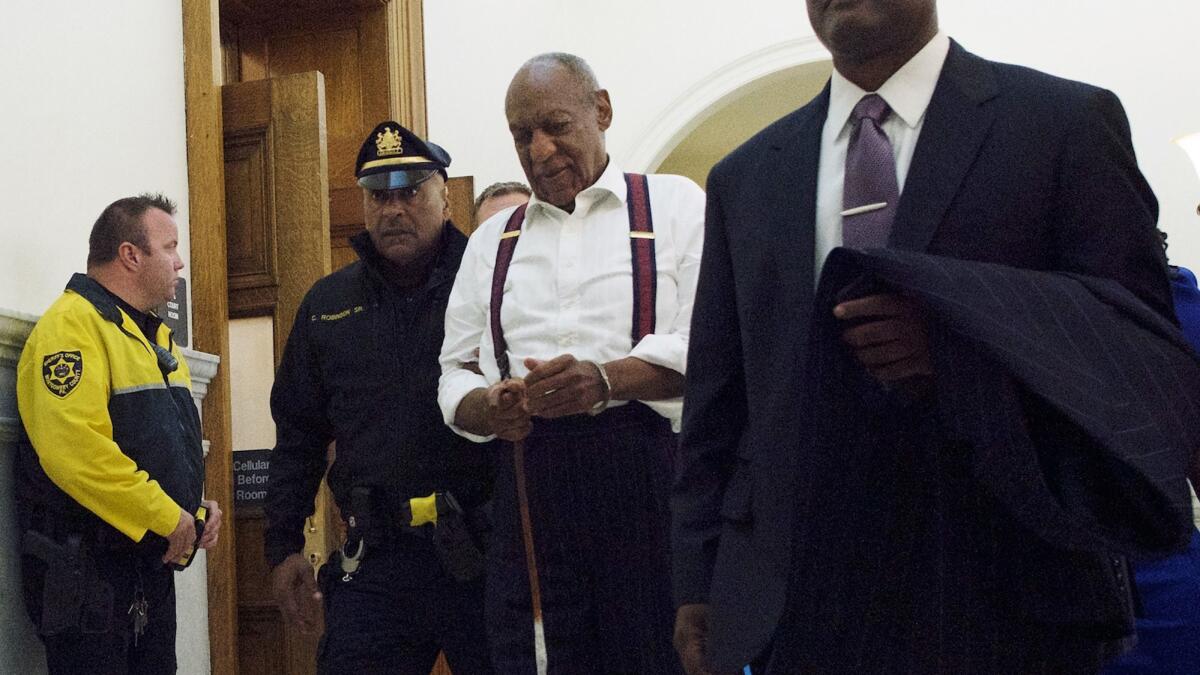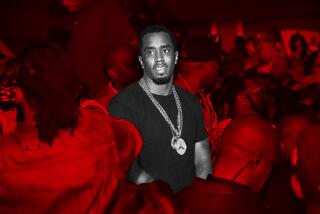Op-Ed: Bill Cosby ‘lynched’? It’s an affront to black history

- Share via
I interviewed Bill Cosby once. It was 2004, and the controversy swirling around him involved not sexual assault, but his unapologetically conservative views about the state of black people.
At an NAACP event commemorating the 1954 Brown vs. Board of Education Supreme Court decision, Cosby shocked the middle-class crowd by venting his anger over what he saw as the poor choices black kids and their parents had made since that ruling — too much TV, too little reading, too much buy-in into America’s consumer culture. Black people were failing their historical mission of bettering themselves through education, Cosby said.
Then he went further: He scoffed at black boys who didn’t pull up their pants, decried “black” names like Shaniequa, scolded incarcerated people who had the bad sense to commit a minor infraction — stealing a piece of pound cake — and getting shot or imprisoned for it.
Cosby’s unsparing message was that whatever our misfortune, we had pretty much brought it on ourselves.
Being a methodical, serial sexual predator is a thing apart from racist pressure.
I was eager to talk to Cosby because, like a lot of black people, I disagreed strenuously with his view and wanted to take him to task. Also like a lot of black people, I admired Cosby as a pioneering entertainer and philanthropist. I was more than a little nervous. I rarely interviewed celebrities of his stature. How would the conversation go? Could I be a fan and a critic at the same time?
I shouldn’t have worried. There was no conversation. From the outset Cosby talked at me, not to me. For about half an hour, he reiterated his pitched rant on the Problem with Black People,” with all its derision and righteousness. I couldn’t get a word in edgewise. He shut me down, on purpose.
The exact way it worked hit me some time later, though, at a town hall meeting in the Crenshaw District that was part of Cosby’s project to spread his controversial new message of uplift. A young woman in the audience, a single mother, described her struggles to him and asked him for advice on how she might improve her lot. It was clear she was impressed by Cosby’s celebrity, by his willingness to come out and speak to the masses.
Cosby responded by icily questioning her as to why she had children she seemed unable to support, and suggesting she had been sexually irresponsible to have had kids at all. The woman looked taken aback, then ashamed. She had been shut down — as a black person who was clearly part of the Problem, and as a woman. I felt for her, as did the entire room.
Bill Cosby has been a problematic hero for a long time. The sexual abuse allegations have been running in the background since at least the year I interviewed him. But as long as they stayed in the background, most black folks were willing to tolerate the contradictions they raised.
Black heroes are a valuable commodity in this country. Cosby’s endurance in the entertainment industry, his singular comedic style that broadened and humanized the black narrative with intricate storytelling instead of one-off jokes or purely political observations, his milestone achievement as the first black actor to co-star in a dramatic TV series — these were reasons enough to make him an institution, and in so doing to give him a pass. Or to write off his personal offenses as the result of the enormous pressures black strivers face in Hollywood (just ask Oprah).
Enter the Fray: First takes on the news of the minute from L.A. Times Opinion »
But being a methodical, serial sexual predator is a thing apart from racist pressure. And even if that pressure plays a role in such behavior, there is simply no way to justify or minimize what Cosby did. Calling his conviction in Pennsylvania and his three-year prison sentence a lynching, as his spokesman, Andrew Wyatt, said last week, is hollow, an affront. It is an insult to black history, to men and women who’ve been lynched, literally and figuratively, including those unjustly punished and even killed for minor infractions such as stealing pound cake, or for countless non-infractions such as reaching for a wallet that a cop mistook for a gun.
Cosby’s offenses were not minor. There are 60-odd credible women, black and white, famous and not, young and mature who identify him as an equal-opportunity assaulter. What links them all is the experience of being savagely shut down, of being ritually silenced — usually by drugging — before being attacked and violated and then shamed into another silence that stood for years.
That collective silence is fully broken, and so is the spell that Cosby cast among black admirers who believed his unassailable place in history, and in the annals of black uplift, made him a role model for life. It did not. Cosby’s accomplishments stand. They always will. But now they form a permanent contradiction to, rather than a complement of, the character of the man we thought he was. His is a deeply unsettling, still unfolding story that, unlike a hero’s tale, will forever remain an open book.
Erin Aubry Kaplan is a contributing writer to Opinion.
Follow the Opinion section on Twitter and Facebook
More to Read
A cure for the common opinion
Get thought-provoking perspectives with our weekly newsletter.
You may occasionally receive promotional content from the Los Angeles Times.









